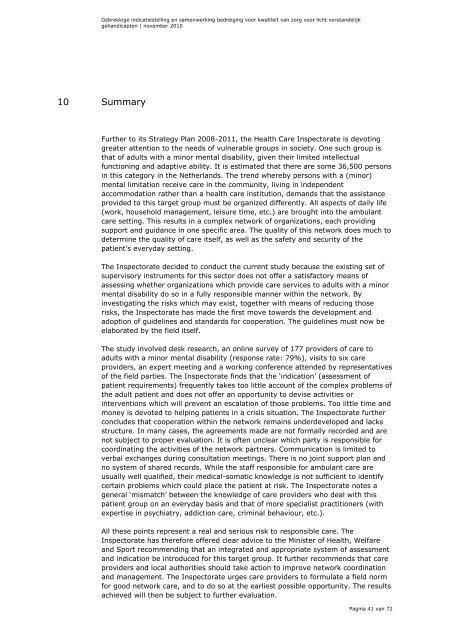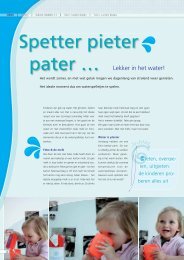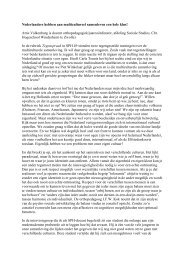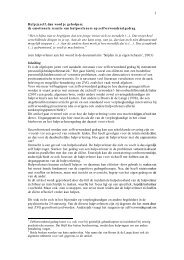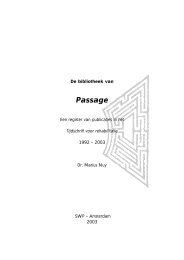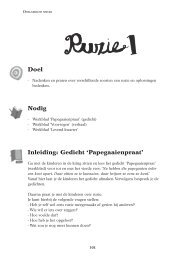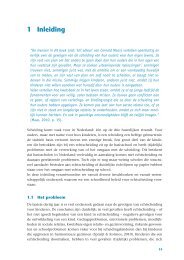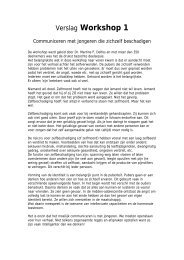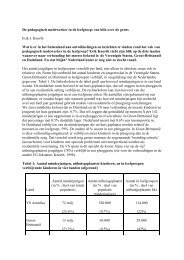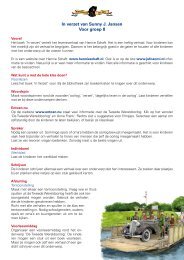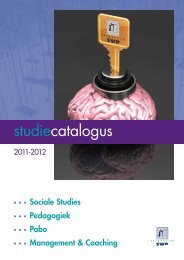Gebrekkige indicatiestelling en samenwerking bedreiging voor ...
Gebrekkige indicatiestelling en samenwerking bedreiging voor ...
Gebrekkige indicatiestelling en samenwerking bedreiging voor ...
Create successful ePaper yourself
Turn your PDF publications into a flip-book with our unique Google optimized e-Paper software.
<strong>Gebrekkige</strong> <strong>indicatiestelling</strong> <strong>en</strong> sam<strong>en</strong>werking <strong>bedreiging</strong> <strong>voor</strong> kwaliteit van zorg <strong>voor</strong> licht verstandelijk<br />
gehandicapt<strong>en</strong> | november 2010<br />
10 Summary<br />
Further to its Strategy Plan 2008-2011, the Health Care Inspectorate is devoting<br />
greater att<strong>en</strong>tion to the needs of vulnerable groups in society. One such group is<br />
that of adults with a minor m<strong>en</strong>tal disability, giv<strong>en</strong> their limited intellectual<br />
functioning and adaptive ability. It is estimated that there are some 36,500 persons<br />
in this category in the Netherlands. The tr<strong>en</strong>d whereby persons with a (minor)<br />
m<strong>en</strong>tal limitation receive care in the community, living in indep<strong>en</strong>d<strong>en</strong>t<br />
accommodation rather than a health care institution, demands that the assistance<br />
provided to this target group must be organized differ<strong>en</strong>tly. All aspects of daily life<br />
(work, household managem<strong>en</strong>t, leisure time, etc.) are brought into the ambulant<br />
care setting. This results in a complex network of organizations, each providing<br />
support and guidance in one specific area. The quality of this network does much to<br />
determine the quality of care itself, as well as the safety and security of the<br />
pati<strong>en</strong>t’s everyday setting.<br />
The Inspectorate decided to conduct the curr<strong>en</strong>t study because the existing set of<br />
supervisory instrum<strong>en</strong>ts for this sector does not offer a satisfactory means of<br />
assessing whether organizations which provide care services to adults with a minor<br />
m<strong>en</strong>tal disability do so in a fully responsible manner within the network. By<br />
investigating the risks which may exist, together with means of reducing those<br />
risks, the Inspectorate has made the first move towards the developm<strong>en</strong>t and<br />
adoption of guidelines and standards for cooperation. The guidelines must now be<br />
elaborated by the field itself.<br />
The study involved desk research, an online survey of 177 providers of care to<br />
adults with a minor m<strong>en</strong>tal disability (response rate: 79%), visits to six care<br />
providers, an expert meeting and a working confer<strong>en</strong>ce att<strong>en</strong>ded by repres<strong>en</strong>tatives<br />
of the field parties. The Inspectorate finds that the ‘indication’ (assessm<strong>en</strong>t of<br />
pati<strong>en</strong>t requirem<strong>en</strong>ts) frequ<strong>en</strong>tly takes too little account of the complex problems of<br />
the adult pati<strong>en</strong>t and does not offer an opportunity to devise activities or<br />
interv<strong>en</strong>tions which will prev<strong>en</strong>t an escalation of those problems. Too little time and<br />
money is devoted to helping pati<strong>en</strong>ts in a crisis situation. The Inspectorate further<br />
concludes that cooperation within the network remains underdeveloped and lacks<br />
structure. In many cases, the agreem<strong>en</strong>ts made are not formally recorded and are<br />
not subject to proper evaluation. It is oft<strong>en</strong> unclear which party is responsible for<br />
coordinating the activities of the network partners. Communication is limited to<br />
verbal exchanges during consultation meetings. There is no joint support plan and<br />
no system of shared records. While the staff responsible for ambulant care are<br />
usually well qualified, their medical-somatic knowledge is not suffici<strong>en</strong>t to id<strong>en</strong>tify<br />
certain problems which could place the pati<strong>en</strong>t at risk. The Inspectorate notes a<br />
g<strong>en</strong>eral ‘mismatch’ betwe<strong>en</strong> the knowledge of care providers who deal with this<br />
pati<strong>en</strong>t group on an everyday basis and that of more specialist practitioners (with<br />
expertise in psychiatry, addiction care, criminal behaviour, etc.).<br />
All these points repres<strong>en</strong>t a real and serious risk to responsible care. The<br />
Inspectorate has therefore offered clear advice to the Minister of Health, Welfare<br />
and Sport recomm<strong>en</strong>ding that an integrated and appropriate system of assessm<strong>en</strong>t<br />
and indication be introduced for this target group. It further recomm<strong>en</strong>ds that care<br />
providers and local authorities should take action to improve network coordination<br />
and managem<strong>en</strong>t. The Inspectorate urges care providers to formulate a field norm<br />
for good network care, and to do so at the earliest possible opportunity. The results<br />
achieved will th<strong>en</strong> be subject to further evaluation.<br />
Pagina 41 van 72


